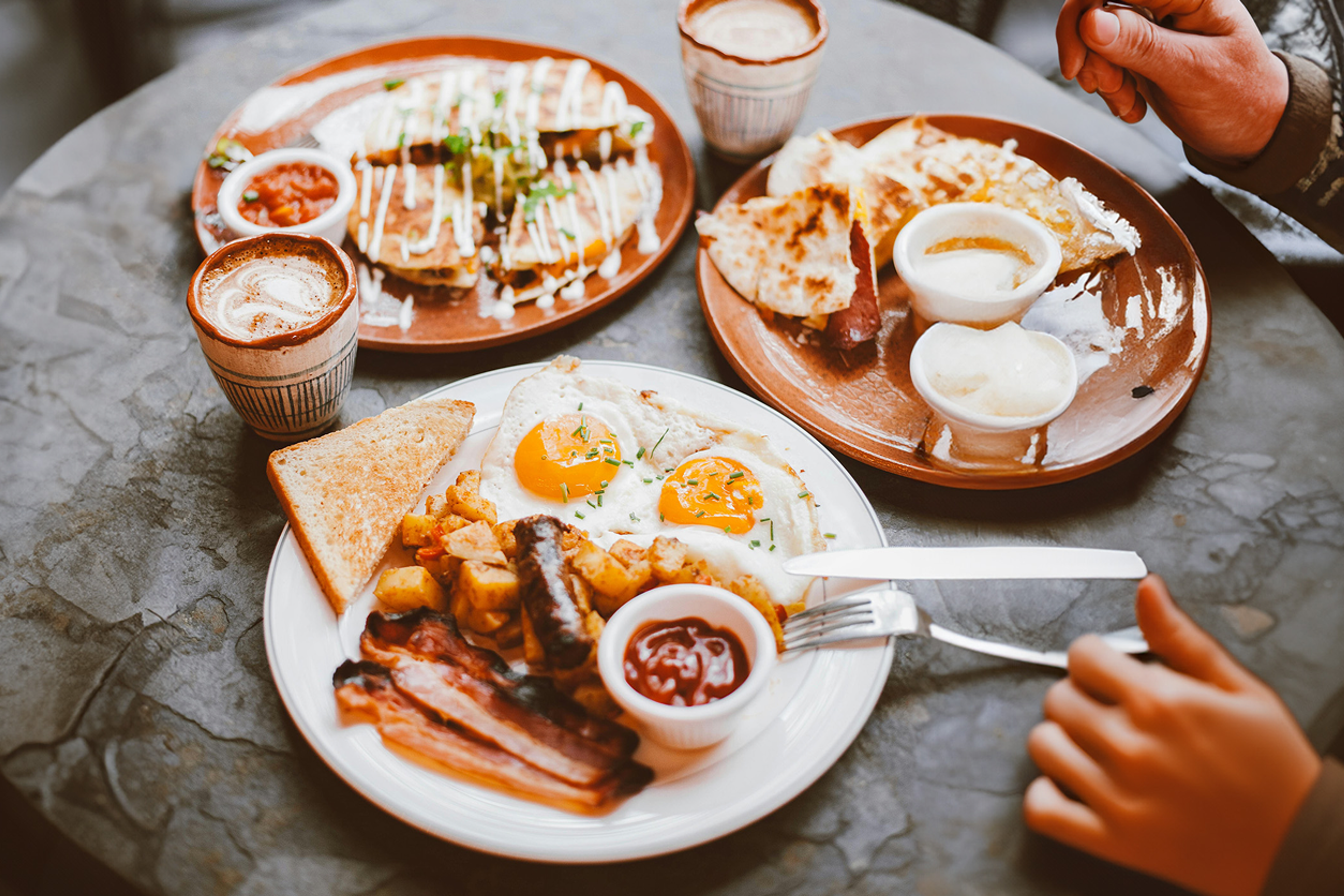

- In recent years, protein has come to be considered the "best" macronutrient, while carbohydrates (and, to a lesser extent, fats) tend to be demonized.
- The truth is that your body needs a balance of all three macronutrients to function properly. Carbohydrates support brain function, help digestion, and give your body vital energy; fats help with vitamin absorption, hormone production, and satiety; and protein supports the immune system and muscle growth, among other functions.
- If you're having trouble following a balanced diet, it can be helpful to work with a registered dietitian who can help you better understand your body's needs.

When I became a dietitian nearly 10 years ago, protein wore a health halo in the wellness world. It was the macronutrient that was touted as the best or “healthiest” among its counterparts (carbs and fats). Now, protein’s halo seems larger and shinier than ever in our culture—from social media to gyms to ads, the message that we should all be eating more protein is inescapable. In fact, a 2025 food and health survey from the International Food Information Council shows that 71% of Americans are trying to eat more protein and about a third have increased their protein intake over the last year, while a “high protein diet” was reported as the most common eating pattern. In my eating disorder nutrition practice, I’ve also noticed that clients typically have the least amount of fear attached to high-protein foods.
While there are likely many reasons why our society is obsessed with protein, there are a few key factors. For one thing, it’s simply never had a negative reputation (like fat in the 90s, and carbs afterward). It’s also the macronutrient most associated with changing body composition (i.e., losing fat and growing muscle), which is a focus for anyone entrenched in diet culture and its harmful beliefs that there is a certain body ideal to chase. Dietitian Ana Pruteanu points out that the protein hype also seemed to increase with the weight loss drug explosion. “Fear of losing muscle mass while losing weight has placed more emphasis on what one could do to limit muscle loss, which often leads to eating more protein,” she explains. “Protein is needed to build and maintain muscle, and our society at this moment is very focused on muscle gain or preventing muscle loss.”
While protein is essential to our health and well-being for a myriad of reasons (more on that later), this hyperfocus on one macronutrient at the expense of others is unnecessary and even detrimental in some cases. Today, we’ll explore the importance of carbs and fats, the truth about protein, and how to strike a relative balance between all three macronutrients.
Why are carbs important?
Carbs get so much hate these days that it’s often (and understandably) hard for many people to believe that they’re the source of energy that our bodies and brains prefer most. “Often, in our society there is a misrepresentation that carbs are empty of nutrition, which couldn’t be further from the truth,” Pruteanu says. “Carbs are an essential macronutrient that our bodies need to function. They are the fuel each cell needs to live and work.” While carbohydrate needs vary from person to person and depend on a variety of factors, like health status and activity level, it’s recommended that most people receive at least half of their calories (and usually more) from carbs on a daily basis.
Here are some examples of the critical role of carbohydrates in the body:
They allow proper brain function.
Research shows the brain uses around 20% of the body’s energy (which is primarily glucose, or sugar, derived from carbs), and eating enough carbs supports important cognitive functions like memory, attention, and decision-making processes.
They help preserve muscle.
If the body doesn’t receive adequate carbs, it will try to get energy by breaking down muscles into amino acids (protein’s building blocks). As Prutaneau explains, this is “not an efficient pathway and often we can feel the side effects of fatigue, impaired muscle recovery and loss of muscle mass, feeling shaky or nauseous, or having a harder time concentrating.” However, when the body receives the carbs it needs, this process is unnecessary, and muscle is preserved.
They support “happy hormone” production.
Carbs are required to produce serotonin, a neurotransmitter regulating mood, sleep, and appetite. Serotonin needs a certain amino acid (tryptophan) for synthesis, and eating carbs increases insulin secretion, which helps transport tryptophan into the brain—making serotonin creation possible.
They provide vitamins and minerals.
Many sources of carbohydrates also provide essential vitamins and minerals, or micronutrients. For example, whole grains (like oats, brown rice, quinoa, or whole wheat bread) provide B vitamins, iron, and zinc, while fruits offer micronutrients like Vitamin C and potassium. Starchy veggies like potatoes and butternut squash provide Vitamins A and C, potassium, and magnesium. Refined carbs (like white breads, pancakes, pasta, rice, and some baked goods) are often fortified with vitamins and minerals, too.
They provide fiber.
Many carb sources (like whole grains, fruits, and starchy vegetables) include fiber, which helps keep your digestive system healthy. It is also linked to lower risk of diabetes and heart disease because it supports healthy blood sugar and cholesterol levels.
In eating disorder recovery, eating enough carbs has even more benefits. “Carbs are also often the easiest nutrient to replenish, which makes them particularly important in eating disorder recovery, where restoring energy balance quickly is key,” explains dietitian Tracy Colin, MS, RDN, LD. Since carbs are currently the most demonized and avoided macronutrient in our culture, and are often fear foods for those with eating disorders, it’s important to eat them regularly—with therapeutic support—during treatment in order to normalize them and create new neuropathways of safety.
“Carbs aren’t something to fear,” Colin adds. “They’re a fundamental part of fueling the body and brain, and a cornerstone of rebuilding a healthy relationship with food.”
Why you need fats
I grew up on non-fat milk as a kid in the 90s. My mother simply thought she was making the healthiest choice for her family, because back then, fats were feared as much as carbs are today. While there isn’t as much societal fearmongering around fats anymore, there seems to be some residual angst about them—even though getting enough is critical for your health and well-being.
Like carbs, fat needs vary by person and depend on many factors, but it’s generally recommended that most people receive anywhere between 20% and 35% of their daily energy from fats. It’s also common for those with eating disorders to fear foods high in fat (like oils, cheese, butter, cream cheese, red meat, salad dressing, and ice cream), often because fats provide the most calories of all the macronutrients. “They’re not ‘extra calories’—they’re a nutrient we need for hormone health, brain function, and overall well-being,” Colin emphasizes.
Here are some reasons why fat is so essential for your body:
They are necessary for vitamin absorption.
“Fats are essential because they allow us to absorb fat-soluble vitamins like A, D, E, and K—without them, those nutrients can’t do their jobs,” Colin explains. For example, the fat in salad dressing helps you absorb the Vitamin A and Vitamin K found in your salad greens, and having fat in your milk helps you absorb the Vitamin D within it.
You need them to feel satisfied.
Chances are high that you’ll leave your meal feeling unsatisfied if you didn’t get enough fat. That’s because fats activate your body’s feeling of satiety—the feeling of being full and satisfied after eating—which signals it’s time to stop eating. Pruteanu adds that fats “flavor our food giving it a delicious taste and texture,” and this make the eating experience more enjoyable, and thus more satisfying.
They help create hormones and cell membranes.
“Fats break down into fatty acids, triglycerides, phospholipids and cholesterol, and these molecules are used by the body to create cell membranes and make hormones,” Pruteanu explains. “When someone is consuming a diet that is very low in fats, they will often experience impaired hormone production.” Cholesterol, for example, is a type of fat that is the precursor for many important hormones like estrogen and testosterone, and fatty acids are essential for producing eicosanoids, which are hormone-like molecules that regulate essential functions like inflammation and blood clotting. Finally, every brain cell membrane contains fats (usually phospholipids and cholesterol) necessary for forming and maintaining nerve connections, which are vital for healthy brain function.
Although they can feel scary, eating fats is a vital part of eating disorder recovery. “Fats provide a concentrated source of energy that can help restore nutritional balance and weight more efficiently,” Colin explains. Regularly eating fats can also help restore the body’s hunger and fullness cues, which are often disrupted by an eating disorder. Additionally, eating fats at all meals and snacks can help to reduce preoccupation with food, since fats contribute to feelings of fullness and satisfaction (and food preoccupation often comes from being undernourished or unsatisfied).
Why you really need protein
Like carbs and fats, protein is an essential macronutrient that you need on a regular basis for your body to survive and thrive. In fact, protein is needed for nearly every bodily process. However, contrary to popular belief, you don’t need more protein than carbs or fats, and “more protein isn’t always better,” Colin says. “The goal isn’t to overload someone but to make sure they’re consistently meeting their requirements as part of a balanced plan.”
Generally, protein recommendations range from 10% to 35% of daily energy needs, but (like the other macronutrients) your individual needs can vary depending on several factors. Like I mentioned, protein is typically the macronutrient group that’s least feared in those with eating disorders, but that’s not always the case. For example, I’ve worked with past clients to address fears surrounding animal proteins (like red meat, poultry, and eggs) because they’d adopted false beliefs from diet culture that such foods are “unhealthy.”
Here are some key reasons why your body needs protein:
Protein helps build and repair cell tissues all over the body.
“Protein breaks down into amino acids, which are the building blocks of any tissue in our body,” Pruteanu explains. This includes everything from hair, skin, and nails to muscles and internal organs. “Protein is necessary to support our muscle mass, for our body to build strong tissues and be able to quickly repair itself,” she adds.
It supports immune function.
Antibodies, which are protective proteins created by your immune system, are necessary for removing foreign substances, like viruses and toxins, from your body. Without adequate protein, your body can’t produce enough antibodies to effectively respond to infections.
Proteins make up vital enzymes and hormones.
Proteins are a key component of enzymes, which are necessary for efficiently carrying out chemical reactions all over the body. For example, the enzyme amylase breaks down carbohydrates so they can be absorbed by the body. Some vital hormones consist of proteins, like growth hormone, which helps promote growth in children and maintain healthy body structure and metabolism in adults.
It helps maintain stable blood sugar levels.
“Since protein digests more slowly than other macronutrients, it can slow down how quickly carbs eaten simultaneously get broken down and absorbed,” Pruteanu explains. “Slower absorption of glucose from carbs leads to fewer blood glucose spikes.” For example, your blood sugar will spike quicker and higher when you eat carbs alone (a handful of crackers) compared to when you eat them with protein (a handful of crackers with peanut butter).
Additionally, a 2025 study on anorexia shows that getting enough protein in recovery can help the body maintain lean tissue (which include muscles, bones, organs, connective tissues, and body fluids) and repair cells, and—when combined with enough calories overall—it can support a healthier, balanced recovery. “I always remind my clients that protein isn’t the only star of the show—it’s important, yes, but a balanced diet means also getting enough carbohydrates, fats, fiber, and micronutrients,” Colin adds. “Protein is a piece of the puzzle, not the whole picture.”
How to strike a (relative) balance of carbs, fats, and proteins
Our bodies and brains need enough of all three macronutrients to be healthy. “When one macronutrient is prioritized while the other ones are ignored, our bodies will show signs of deficiency,” Pruteanu explains. "Even if your goal is to build muscle and you are aiming to eat more protein, your diet should still consist primarily of carbohydrates, followed by proteins and fats.”
But it’s also important to take this information as a guide, not strict rules that need to be followed exactly: despite what diet culture says, trying to rigidly balance your macronutrients is not necessary, and can become obsessive and unhealthy. “It’s not about being ‘perfect’ with macros, but about rebuilding trust with food, honoring your body’s needs, and making sure no single nutrient is left out of the picture,” Colin explains. “Having all three macronutrients throughout the day supports metabolism, satiety, and nutrient absorption.”
So, shoot to strike a relative balance of carbs, fats, and proteins by including all three at every meal: this means carbs (e.g. bread, pasta, rice, and fruit), fats (e.g. salad dressing, avocado, olive oil, and nuts), and proteins (e.g. chicken, fish, eggs, and legumes). For example, your breakfast might include toast (carb) with butter (fat), eggs (protein) cooked with oil (fat) and cheese (fat), and fruit (carb). “For snacks, pair a carbohydrate with either a fat or protein for the same effect—think fruit with nut butter or crackers with cheese,” Colin suggests. For visual examples of balanced plates, the Plate-by-Plate Approach on Instagram is a good resource.
Additionally, try including a variety of macronutrient sources, including simple and complex carbs, unsaturated and saturated fats, and plant and animal proteins, because they offer varying vitamins, minerals, and other nutrients, and support mental and emotional well-being. Here are some examples of each category:
- Simple carbs: fruit, white bread or rice, white potatoes, cookies or cakes
- Complex carbs: oats, whole wheat bread or rice, sweet potatoes, quinoa
- Unsaturated fats: avocados, olive oil, nut butters, nuts
- Saturated fats: butter, beef, pork, cheese
- Plant proteins: legumes, nuts, nut butters, tofu
- Animal proteins: eggs, chicken, fish, beef
Wondering about where non-starchy veggies (e.g. spinach, broccoli, lettuce, and bell peppers) fit in? Add them to your plate as you wish—they provide essential vitamins and minerals, and fiber—but keep in mind they aren’t going to provide adequate energy on their own. Since everyone has varying nutrient and energy needs, it’s best to work with a dietitian to help you understand your individual needs and develop a meal structure or eating pattern that supports the healthiest version of you.
- Protein-Dazed, And Still Confused: New IFIC Research Reveals America’s High-Protein Hype Doesn’t Match Knowledge - IFIC. (2025, July 10). IFIC. https://ific.org/media/protein-dazed-and-still-confused-new-ific-research-reveals-americas-high-protein-hype-doesnt-match-knowledge/?
- Protein seems to suddenly be everywhere. Here’s why. (2025, January 30). NPR. https://www.npr.org/2025/01/30/nx-s1-5270923/protein-seems-to-suddenly-be-everywhere-heres-why
- Holesh, J. E., Aslam, S., & Martin, A. (2023, May 12). Physiology, Carbohydrates. Nih.gov; StatPearls Publishing. https://www.ncbi.nlm.nih.gov/books/NBK459280/?
- Espinosa-Salas, S., & Gonzalez-Arias, M. (2023, August 8). Nutrition: Macronutrient Intake, Imbalances, and Interventions. PubMed; StatPearls Publishing. https://www.ncbi.nlm.nih.gov/books/NBK594226/
- Arshad, M. T., Maqsood, S., Altalhi, R., Shamlan, G., Mohamed Ahmed, I. A., Ikram, A., & Abdullahi, M. A. (2025). Role of Dietary Carbohydrates in Cognitive Function: A Review. Food Science & Nutrition, 13(7). https://doi.org/10.1002/fsn3.70516
- Margolis, L. M., & Pasiakos, S. M. (2023). Low carbohydrate availability impairs hypertrophy and anaerobic performance. Current Opinion in Clinical Nutrition & Metabolic Care, Publish Ahead of Print. https://doi.org/10.1097/mco.0000000000000934
- Arshad, M. T., Maqsood, S., Altalhi, R., Shamlan, G., Mohamed Ahmed, I. A., Ikram, A., & Abdullahi, M. A. (2025). Role of Dietary Carbohydrates in Cognitive Function: A Review. Food Science & Nutrition, 13(7). https://doi.org/10.1002/fsn3.70516
- Mayo Clinic . (2024, November 4). Dietary fiber: Essential for a healthy diet. Mayo Clinic; Mayo Clinic. https://www.mayoclinic.org/healthy-lifestyle/nutrition-and-healthy-eating/in-depth/fiber/art-20043983
- and, E., Jackson, L. M., Parker, R. M., & Mattison, D. R. (2020, July). Reproductive Steroid Hormones: Synthesis, Structure, and Biochemistry. Nih.gov; National Academies Press (US). https://www.ncbi.nlm.nih.gov/books/NBK562873/?
- Yamaguchi, A., Botta, E., & Holinstat, M. (2022). Eicosanoids in inflammation in the blood and the vessel. Frontiers in Pharmacology, 13, 997403. https://doi.org/10.3389/fphar.2022.997403
- Custers, Emma, E. M., Kiliaan, & Amanda, J. (2022). Dietary lipids from body to brain. Progress in Lipid Research, 85, 101144. https://doi.org/10.1016/j.plipres.2021.101144
- Anorexia and Dietary Fat: Brain Function, Hunger and Satiety. (2020). Psychology Today. https://www.psychologytoday.com/us/blog/hunger-artist/202003/anorexia-and-dietary-fat-brain-function-hunger-and-satiety
- Yan, L. (2024). Exploring proteins: The building blocks of life essential for muscle growth, repair, immune function, and overall health in nutrition. Journal of Nutrition and Human Health, 8(5). https://doi.org/10.35841/aajnhh-8.5.232
- Cleveland Clinic. (2022, May 6). Antibodies. Cleveland Clinic. https://my.clevelandclinic.org/health/body/22971-antibodies
- MedlinePlus. (2021, March 26). What are proteins and what do they do? Medline Plus; National Library of Medicine. https://medlineplus.gov/genetics/understanding/howgeneswork/protein/
- Cleveland Clinic. (2022, June 21). Human Growth Hormone (HGH). Cleveland Clinic. https://my.clevelandclinic.org/health/articles/23309-human-growth-hormone-hgh
- Dozio, E., Alonge, M., Tori, G., Caumo, A., Russo, R. G., Edoardo Scuttari, Fringuelli, L., & Terruzzi, I. (2025). Dynamic Nutrition Strategies for Anorexia Nervosa: Marker-Based Integration of Calories and Proteins. Nutrients, 17(3), 560–560. https://doi.org/10.3390/nu17030560







